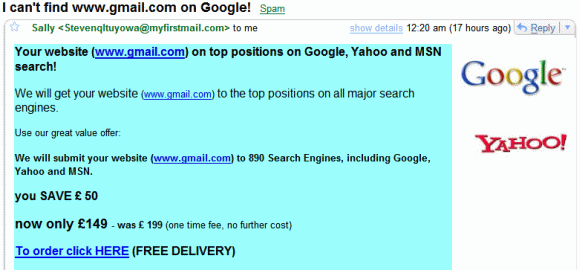The techniques responsible for this growth are image spam and the use of "vast networks of computers belonging to users who unknowingly downloaded viruses and other rogue programs".
Spammers try to fool message filters by using excerpts from books or articles. OCR software is not very effective because image spams use special effects, background images and weird fonts.
Traditional spam is still effective, as many mail services don't have powerful spam filters.

I, too, have been getting lots of new strange spam messages in my gmail account. Some seem to have interesting subjects but deteriorate into gibberish as you read them. But, here is the question: What's the point? Why do they do it? They do not ask for anything, so not fishing; they sell nothing. So, why are they doing this.
ReplyDeletemay b cos they don't have any other thing to do :)
ReplyDeleteDougal Campbell wrote an interesting post on this about a year ago: it's called poisoning the well.
ReplyDeletehttp://dougal.gunters.org/blog/2005/12/06/poisoning-the-well
In a nutshell, sending gibberish that sells nothing confuses the spam filters and future gibberish messages with a sales payload are more likely to be accepted.
1670 spam this last 30 days, and growing 100 per day.
ReplyDeletepd: In gmail
One thing I can think of might be an image virus. I read a while back that it is possible to place a program within a .gif picture. This is why so many systems, gmail included, block images. Any image can also "call home" confirming that your email address is valid. A valid address sells for about a quarter each to spam networks. I personally have began to wonder if emails aren't begining to show signs of a feedback loop. Like the squeal of a microphone to close to speakers, with some of those gibberish spams, it almost looks like echos, or ripples are occuring in the internet continuum. Eh, who knows. It is getting to be a pain in the booty clearing out the spam box. Gmail might as well delete them outright, or bounce them back as a DOS attack against the companies that allow such large mass mails to be sent. Cripple the bastards! I say! Who's with me?!
ReplyDeleteA bit off topic, but while talking about spam, I'd like to mention a shortcoming in Google's Gmail. Sum-up here:
ReplyDeletehttp://netzreport.googlepages.com/gmail_the_problem_with_spam_mails.html
Hopefully this will be fixed soon.
Regards,
Pete